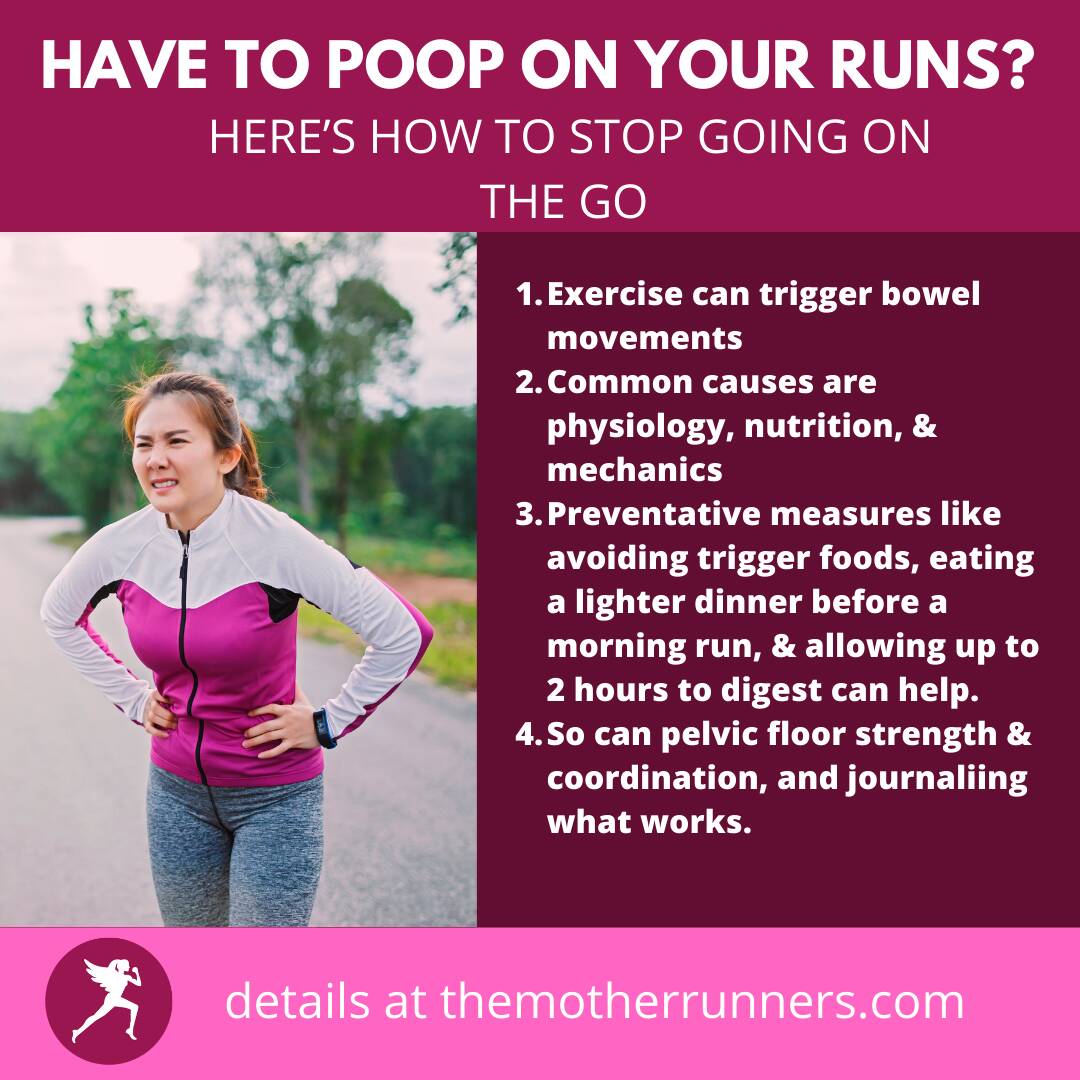Having to poop while running is a common problem among runners. The cause is usually physiological, nutritional, or mechanical. I speak with experts to help runners identify the cause of their runner’s trots so they can prevent having to go during their run. Common preventative measures involve emptying prior to a run, allowing enough time to digest foods, avoid trigger foods, and ensuring you have proper pelvic floor muscle control.


Reviewed by Dr. Janine Bobby Ellison, PT, DPT & Megan Robinson, RD — I had an athlete the other day annoyed that every time she went for a run, she would have to poop—like seven miles away from her house. She wanted to know why does running make you poop? And how can you stop pooping on the run? So, I asked the experts.
Unfortunately for her, she doesn’t have woods nearby. So, she’d have to finish her run, basically clenching her butt for miles. She seemed to do all the right things. Going before she ran, eating simple food pre-run, and letting it digest before she headed out the door. What gives?
I wanted to help her with this predicament—along with many other endurance athletes who struggle with runner’s diarrhea or runner’s trots. So, I talked with key experts including a sports nutritionist and a pelvic floor physical therapist.
The good news is that we were able to identify what she needed to do was wait a full two hours after eating before running. And now, I hope this article helps you identify what may help you put an end to your GI distress on your next run!
Remember: I am not a doctor though I did consult them for this article. Consult your healthcare professional if you have any health concerns!
Now, let’s go so you don’t have to “go” on the run!
Related: How to Poop Before Running?
Why does running make you poop?
Having to poop when running is a common issue among runners of all kinds that it has been dubbed runner’s trots or runner’s diarrhea or runner’s stomach. In fact, a third of runners report having exercise-induced diarrhea or loose bowel movements during a run—with it being especially common during long distances and intense exercise (raising hand).
The reason: Running and physical activity gets the GI tract moving (also known as gut motility) because there is a lack of blood flow.
There are three main reasons for gastrointestinal symptoms during running:
- Physiological
- Nutritional, or
- Mechanical
I will address these three main potential causes below.
Related: Should You Eat Before You Run?
Physiological Causes of GI Symptoms While Running:
- Lack of blood distribution between the intestines and muscles
- Hormonal changes (including during your period)
- Race day jitters, anxiety, and stress and related hormones
- Mechanical stimulation of the organs
- GI disease such as Crohn’s, IBS, runner’s colitis, and celiac disease


Nutritional Causes of GI Symptoms While Running:
What you eat and when before your run can have a huge impact on whether you suffer from runner’s diarrhea or have the urgent need to poop on the run.
Registered sports dietitian Megan Robinson gave me the low down on what factors may trigger runner’s trots.
Related: Should I Drink Coffee Before Running?
Potential Nutrition Triggers for Runner’s Trots, according to an RD
- Medications such as laxatives, antibiotics, NSAIDS, or other medications like GLP-1/metformin to treat obesity or diabetes which can cause diarrhea or increased frequency of stool.
- Eating too close to running
- Drinking too much caffeine (coffee) before running which is acidic and can cause stool frequency
Related: MUD/WTR vs. Coffee: What’s Better for Runners?
- Eating trigger foods including:
- Beans
- Broccoli/cauliflower
- High fiber foods including cereals or bars
- Fructose or artificial sweeteners common in nutrition bars
- Dairy
- Over-eating carbs which when not absorbed in the small intestines can draw water from your blood causing loose stools
- Fatty foods like peanut butter or high-calorie meals
- Over-hydrating


Related: Runner’s Guide: How to Train Your Gut
Nutrition Tips to Avoid Runner’s Trots, According to an RD
- Keep a journal of what you ate, when, and how you felt to identify triggers
- Consider taking out trigger foods and drinks, or limiting them (such as drink less caffeine)
- Perform trial and error with what you eat and when before your runs
- Eat more plainly the night before a run including simple foods such as rice, chicken, or pasta
- Practice gut training by eating smaller amounts of carb throughout a long run (more on that here)
- Have a solid meal plan the day before and of a big race that you practice during your training
- Ensure you are hydrating and eating well throughout the day.
- Always try to go before you head out the door!
Related: How to Carb Load for a Marathon & Half Marathon
If you cannot eat before a run (for example, you need two hours to digest food which means you’d have to wake up at 3 am to eat, drink your nutrition instead, says Robinson. She suggests an isotonic sports drink like Tailwind or Skratch. This can also be an option if you struggle with stomach distress during your training runs from energy gels.
“Timing meals around training is key,” Robinson adds. “If you only have 30 min to eat before a run, keep the pre-run snack small, less than 150 calories, 15-25 grams carb (low fat, low fiber, low protein) like a banana, pretzels or rice cakes. But if they have 2 hours between eating and a run, they can add a little protein/fat, but still carb based and low fiber such as toast with PB and fruit.”
More on what you eat before your morning run here.
Related: 20+ Snack Ideas for Runners


Mechanical Causes of GI Symptoms While Running:
Muscle strength and coordination of the pelvic floor (the muscles that hold your internal organs) are important for both bowel and bladder control. Weakened or hypertonic pelvic floor muscles can contribute to recurring accidental bowel leakage called fecal incontinence.
Related: Tight Pelvic Floor in Runners: Symptoms & Solutions
Unfortunately, learning how to control your pelvic floor muscles isn’t something you can read about online to fix—a visit with a pelvic floor physical therapist is most likely needed.
“Finding the true roots of the problem will make fixing a frustration like this very doo-able (pun intended),” says Dr. Janine Bobby Ellison, PT, DPT, (and my pelvic floor PT).
Related: Ultimate Fueling Guide for Runners
From a pelvic floor perspective, Dr. Ellison explains, intraabdominal pressure during running is a common cause for a runner to have to poop. She explains:
Intraabdominal pressure is the natural pressure between the container made by the diaphragm, the pelvic floor, the back muscles and spine, and abdominal muscles. It increases during many natural daily activities, like squatting or walking. But if that pressure becomes too high, we might feel it in some way. Those ways might include pelvic floor pressure sensation, heartburn, leaking urine or stool, involuntarily passing gas, back or hip pain, etc.
Related: How I Fueled by 2:54 Marathon
A rehabilitation plan with a PF PT would focus on strength, mobility, and appropriate reactions of all the core muscles mentioned above during those activities.
A pelvic floor PT would also ensure your bigger muscles are absorbing and transferring force appropriately when running, as well. Learn how to find a pelvic floor PT near you here.
Related: Ultimate Fueling Guide for Runners
Runner’s Trots Survival Guide
If you have issues with the occasional urge to poop on the run, try the below hacks:
- Drink warm liquids before a run, like a cup of coffee
- Leave enough time to go and completely empty your bowel contents
- Eat a small snack and wait 1-2 hours for it to digest
- Avoid trigger foods
- Run with toilet paper
- Do a warm-up jog so you can take a pit stop back at home
- Use only liquid nutrition if gels or food tend to irritate your digestive tract or cause abdominal pain
- Be hydrated but don’t drink too many liquids (read my hydration for runners guide here)
- Choose a route with toilets and leave time to use portable toilets at your next race
- Aim to have regular bowel movements and “go” on a regular schedule
- Keep a journal to document what works and what doesn’t
For me personally (at the risk of TMI), I will wake up extra early so I have time to drink coffee, eat, and empty completely before I run—even if that requires a 3 a.m. wake-up (though I do try to avoid this situation!).
I hope this advice helps you decrease the frequency of your GI issues so that you can get to your finish line without having to rush for the pot!!
If you want guidance with your running goals including running while pregnant or postpartum, check out my run coaching services. Also, be sure to check out my free training plans:
